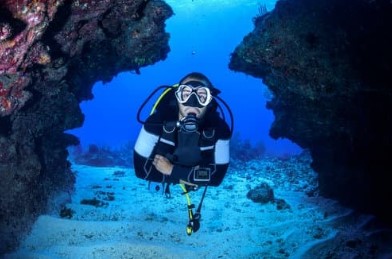Why Mental Health Matters in Scuba Diving
When most divers prepare for a trip, they think about physical health, equipment checks, or environmental conditions. But what about mental health?
Scuba diving combines physical, environmental, and psychological stressors. Being underwater demands sharp decision-making, emotional control, and trust in your training. If your mental state isn’t steady, your safety—and your enjoyment—can be compromised.
From scuba diving anxiety to post-incident stress, mental health plays a role at every stage of a diver’s journey. Recognizing and addressing these challenges is essential, whether you’re a new diver or a seasoned professional with thousands of dives logged.
1. Scuba Diving Anxiety and Panic Underwater
Why anxiety happens underwater
Feeling nervous before a dive is normal, especially for beginners. But if anxiety escalates underwater, it can lead to panic—a leading contributor to scuba accidents. Panic may cause divers to make rash decisions like bolting to the surface, which can result in injury.
Common triggers include:
Claustrophobia from masks and wetsuits.
Fear of equipment failure.
Sudden changes in visibility or current.
A sense of being “trapped” at depth.
How to manage scuba diving anxiety
Practice breathing techniques: Slow, deep breathing helps calm both body and mind.
Build confidence with refresher training: Practicing skills like mask clearing in a controlled environment can reduce fear.
Choose the right buddy: Dive with someone you trust and who respects your pace.
Start small: If you’re anxious, ease back in with shallow or calm-water dives before attempting deeper dives.
By proactively addressing anxiety, divers can reduce the chance of panic and create safer, more enjoyable experiences.
2. Post-Incident Stress and Diving Trauma
How incidents affect divers
Even experienced divers can experience trauma after a dive accident or near miss. Rapid ascents, entanglements, running low on air, or witnessing another diver’s distress can leave lasting emotional effects. Some divers develop post-traumatic stress disorder (PTSD) symptoms, including flashbacks, nightmares, or avoidance of diving altogether.
Signs of post-incident stress
Reluctance to dive after an accident.
Physical tension or fear before entering the water.
Difficulty concentrating on dive briefings or skills.
Recovery strategies
Debrief with your dive team: Talking about what happened helps process the event.
Take a break: It’s okay to step away from diving until you feel ready.
Seek professional support: Trauma-informed therapy or counseling can help divers recover and rebuild confidence.
Remember, acknowledging trauma is not a weakness. It’s part of ensuring long-term safety and enjoyment in the sport.
3. Depression and Diving Safety
The hidden risks of diving with depression
Depression can be subtle but dangerous in a scuba context. It affects focus, decision-making, and judgment, all of which are critical for safe diving. A diver struggling with depression may skip safety checks, underestimate risks, or lose motivation to follow training protocols.
Warning signs to watch for
Lack of enthusiasm for planned dives.
Difficulty concentrating on dive plans.
Increased irritability or withdrawal from dive groups.
What to do if you’re struggling
Assess your mental state: Just as you wouldn’t dive with a cold, don’t dive if you’re not mentally prepared.
Communicate with your buddy: Let them know if you’re not feeling 100%.
Prioritize mental health treatment: Professional help can make diving both safer and more enjoyable.
A healthy mindset is not optional—it’s as essential as a working regulator or a full tank.
4. The Therapeutic Benefits of Scuba Diving
It’s important to recognize the positive impact diving can have on mental health. For many, scuba diving is more than a sport—it’s therapy.
Why diving is therapeutic
Controlled breathing: Mimics mindfulness and meditation techniques.
Weightlessness: Relieves physical strain, offering a sense of freedom.
Connection with nature: Immersion in the underwater world reduces stress and fosters awe.
Programs that use diving for therapy
Deptherapy (UK): Helps veterans and individuals with physical or psychological injuries heal through diving.
Disabled Divers International (DDI): Provides accessible diving opportunities worldwide.
Wellness retreats: Many dive resorts now promote scuba as a form of mental wellness.
For some, the water becomes a sanctuary—a place to leave daily stresses behind and focus on the present moment.
5. Building Community to Prevent Isolation
Despite being a buddy sport, scuba can sometimes feel isolating. Divers who don’t have a regular partner or who struggle with confidence may feel disconnected. Isolation not only reduces enjoyment but can also increase risks by limiting support networks.
How to stay connected
Join local dive clubs: Regular meetups help build friendships and trust.
Dive forums and online groups: Platforms like ScubaBoard allow divers to share experiences and advice.
Buddy relationships: A supportive buddy who understands your strengths and limits can make every dive safer.
Community is more than companionship—it’s a safety net. Strong relationships encourage accountability and support for both physical and mental well-being.
Where Divers Can Find Mental Health Support
If you or a dive buddy are struggling, there are trusted resources available:
Divers Alert Network (DAN): Offers research, articles, and 24/7 hotlines for divers in distress.
PADI and NAUI training centers: Many instructors are experienced in helping divers manage confidence issues.
Mental health professionals: Look for therapists specializing in sports psychology or trauma recovery.
Peer support groups: Online communities, veteran programs, and wellness diving initiatives provide valuable encouragement.
Crisis hotlines: In the U.S., call 988 for the Suicide & Crisis Lifeline.
Final Thoughts
Scuba diving is about balance—between safety and exploration, between control and freedom. Mental health is a critical part of that balance.
By addressing challenges like scuba diving anxiety, post-incident stress, and depression—and by embracing the therapeutic and community aspects of diving—we can make the underwater world not only safer but also more rewarding.
Every diver should remember: checking in with your mental health is as important as checking your gear. By supporting ourselves and each other, we ensure that diving remains the joyful, life-changing experience it’s meant to be.

